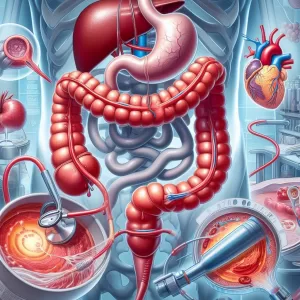Qu'est-ce que l'athérosclérose?
[wp_show_posts id=””]
**What Is Atherosclerosis?**
Atherosclerosis, also known as arteriosclerosis, is a condition in which the arteries become narrowed and hardened due to the buildup of plaque. Plaque is made up of cholesterol, fat, calcium, and other substances.
Atherosclerosis is a serious condition because it can lead to heart attack, stroke, and other complications.
**What Causes Atherosclerosis?**
The exact cause of atherosclerosis is not known, but there are a number of risk factors that can contribute to its development, including:
* High cholesterol
* High blood pressure
* Diabetes
* Smoking
* Obesity
* Physical inactivity
* Family history of atherosclerosis
* Age (the risk of atherosclerosis increases with age)
**What Are the Symptoms of Atherosclerosis?**
Atherosclerosis often does not cause any symptoms in its early stages. As the condition progresses, however, you may experience symptoms such as:
* Chest pain (angina)
* Shortness of breath
* Leg pain
* Numbness or weakness in your arms or legs
* Trouble speaking or understanding speech
* Vision problems
* Dizziness or fainting
**How Is Atherosclerosis Diagnosed?**
Atherosclerosis can be diagnosed with a variety of tests, including:
* Physical exam
* Blood tests
* Cholesterol tests
* Imaging tests, such as X-rays, MRI, and CT scans
**How Is Atherosclerosis Treated?**
There is no cure for atherosclerosis, but it can be treated with medications, lifestyle changes, and surgery.
Medications that can treat atherosclerosis include:
* Statins: These medications lower cholesterol levels.
* Aspirin: Aspirin helps to prevent blood clots.
* ACE inhibitors or ARBs: These medications lower blood pressure.
* Beta-blockers: Beta-blockers lower blood pressure and slow the heart rate.
Lifestyle changes that can help to treat atherosclerosis include:
* Quitting smoking
* Eating a healthy diet
* Getting regular exercise
* Maintaining a healthy weight
Surgery may be necessary to treat atherosclerosis if it is severe. Surgery options include:
* Angioplasty: Angioplasty is a procedure that widens narrowed arteries.
* Stenting: Stenting is a procedure that involves placing a stent in a narrowed artery to keep it open.
* Bypass surgery: Bypass surgery is a procedure that creates a new pathway for blood to flow around a blocked artery.
**How Can I Prevent Atherosclerosis?**
There are a number of things you can do to help prevent atherosclerosis, including:
* Eat a healthy diet
* Get regular exercise
* Maintain a healthy weight
* Quit smoking
* Control your cholesterol and blood pressure
* Get regular checkups
**Sources**
* Mayo Clinic: Arteriosclerosis / Atherosclerosis – Diagnosis and treatment
* Mayo Clinic: Arteriosclerosis / Atherosclerosis – Symptoms and causes
* American Heart Association: What is Atherosclerosis?
**What Is Atherosclerosis?**
Atherosclerosis, also known as arteriosclerosis, is a condition in which the arteries become narrowed and hardened due to the buildup of plaque. Plaque is made up of cholesterol, fat, calcium, and other substances.
Atherosclerosis is a serious condition because it can lead to heart attack, stroke, and other complications.
**What Causes Atherosclerosis?**
The exact cause of atherosclerosis is not known, but there are a number of risk factors that can contribute to its development, including:
* High cholesterol
* High blood pressure
* Diabetes
* Smoking
* Obesity
* Physical inactivity
* Family history of atherosclerosis
* Age (the risk of atherosclerosis increases with age)
**What Are the Symptoms of Atherosclerosis?**
Atherosclerosis often does not cause any symptoms in its early stages. As the condition progresses, however, you may experience symptoms such as:
* Chest pain (angina)
* Shortness of breath
* Leg pain
* Numbness or weakness in your arms or legs
* Trouble speaking or understanding speech
* Vision problems
* Dizziness or fainting
**How Is Atherosclerosis Diagnosed?**
Atherosclerosis can be diagnosed with a variety of tests, including:
* Physical exam
* Blood tests
* Cholesterol tests
* Imaging tests, such as X-rays, MRI, and CT scans
**How Is Atherosclerosis Treated?**
There is no cure for atherosclerosis, but it can be treated with medications, lifestyle changes, and surgery.
Medications that can treat atherosclerosis include:
* Statins: These medications lower cholesterol levels.
* Aspirin: Aspirin helps to prevent blood clots.
* ACE inhibitors or ARBs: These medications lower blood pressure.
* Beta-blockers: Beta-blockers lower blood pressure and slow the heart rate.
Lifestyle changes that can help to treat atherosclerosis include:
* Quitting smoking
* Eating a healthy diet
* Getting regular exercise
* Maintaining a healthy weight
Surgery may be necessary to treat atherosclerosis if it is severe. Surgery options include:
* Angioplasty: Angioplasty is a procedure that widens narrowed arteries.
* Stenting: Stenting is a procedure that involves placing a stent in a narrowed artery to keep it open.
* Bypass surgery: Bypass surgery is a procedure that creates a new pathway for blood to flow around a blocked artery.
**How Can I Prevent Atherosclerosis?**
There are a number of things you can do to help prevent atherosclerosis, including:
* Eat a healthy diet
* Get regular exercise
* Maintain a healthy weight
* Quit smoking
* Control your cholesterol and blood pressure
* Get regular checkups
**Sources**
* Mayo Clinic: Arteriosclerosis / Atherosclerosis – Diagnosis and treatment
* Mayo Clinic: Arteriosclerosis / Atherosclerosis – Symptoms and causes
* American Heart Association: What is Atherosclerosis?
Un commentaire
Laisser un commentaire
Articles populaires







Atherosclerosis is the narrowing of arteries due to a buildup of plaque